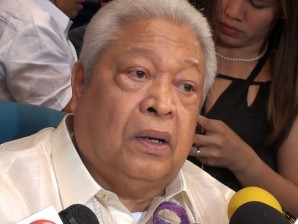New lawmakers get advice on benefits of pork
MANILA, Philippines—Despite its unsavory history, pork is not all bad and can even be a lifeline for many constituents.
This is one of the lessons outgoing Albay Rep. Edcel Lagman would like to impart to incoming members of the 16th Congress, particularly the first-termers.
Speaking during the legislative orientation course for new House representatives on Monday, Lagman delivered a veritable apologia for the much-derided pork, or more precisely, pork barrel politics.
He noted the misconceptions surrounding the congressional pork barrel—officially called the priority development assistance fund (PDAF)—which involves large sums from the budget being made available to congressmen and senators, to fund various projects in their congressional districts, or area of their choosing, in the case of senators.
Much of the criticism of the pork barrel is that it involves projects intended to benefit the constituents of a politician in a particular area in return for their political support, either in the form of campaign contributions or votes, but the costs are borne by all taxpayers. Moreover, the award of such projects is notoriously riddled with corruption, with the lawmakers getting a percentage of the contract price.
Article continues after this advertisementNo to pork abolition
Article continues after this advertisementLagman told the new House members that despite the harsh criticism leveled against the pork barrel, its benefits to their constituents outweighed whatever flaws it may have.
“Concededly, the PDAF is not a perfect allocation. And legislators are not perfect functionaries. However, its attendant imperfections do not justify the abolition or reduction of the PDAF, either of which would be counterproductive,” he said.
During the open forum that followed, Lagman told the lawmakers that they must fight for their right to use their PDAF, should the Executive decide to withhold it from them, which has been known to occur in some administrations, past and present.
They could even file cases in the courts to question the Executive’s act of denying them the funds, he said.
“That exercise of power, that abuse of power, can be challenged in the courts,” Lagman told the incoming lawmakers, when he was asked whether the Executive had the power to deprive a member of Congress of the PDAF.
Integral to lawmaking
In his speech, Lagman said House representatives have duties aside from making laws, and these include protecting the interests and concerns of their constituencies by funding various projects and programs that are supposed to benefit them.
Projects funded by the PDAF could include scholarships, medical assistance for indigent patients, the construction of a bridge in the hinterlands, repair of typhoon-damaged schools in remote barangays (villages) and the like.
“The selection and financing of priority development projects and programs are attributes of, and integral, to lawmaking,” said Lagman.
“If the PDAF is abolished, the countless marginalized beneficiaries are the ones to be deprived of benefits,” he said.
Lagman advised the new lawmakers to see to it that their PDAF goes to projects that their constituents need, and which would serve the greatest number of beneficiaires, not just the lawmakers’ diehard supporters. He further said they must prioritize projects outside the radar of national agencies, which are more concerned with mega-projects.
Lagman noted that the PDAF, which amounts to P70 million for each congressman and P200 million for each senator, only makes up less than 1 percent of the annual budget for new appropriations, automatic appropriation, and debt service-principal amortization.
Funds not discretionary
However, the PDAF is not at all a discretionary fund, or a personal fund of the lawmakers, Lagman said.
The use of the funds requires lawmakers to choose from a “strict menu of qualified projects,” and the funding releases do not pass through the legislator’s office. The special allotment release order (Saro) to release the funds is issued by the budget department to the executive agency in charge of implementing the project or projects to be funded by the legislator’s pork.
The projects are also subjected to public bidding, and the fund disbursements are audited by the Commission on Audit.
Not patronage either
The PDAF is not graft-ridden, Lagman claimed, as the implementation of the pork-funded projects is monitored by opponents of the incumbent lawmakers, civil society organization, and religious and anticorruption groups.
The pork barrel is not a “patronage award” either, he said. The projects funded by the PDAF are selected based on requests from constituents, local government officials, and political leaders, he said.
The fund is propeople and propoor, because it addresses the priority needs of the marginalized and the disadvantaged, he noted. It also generates employment because infrastructure projects employ local skilled and unskilled workers, he added.
Budget never enough
Still another argument for pork that Lagman put forward is that the budgets of national agencies are never enough, and the PDAF serves to augment these so that constituents could be directly served.
He explained that if the PDAF were to be added to the agencies’ budgets, it may be spread out too thinly to be effective or could be sidelined by the lobbying of interested parties as to run the risk that the money would mostly go to influential legislators.
Finally, Lagman argued that the PDAF has long been held to be legal and constitutional by the Supreme Court. He said the high court had ruled that the pork barrel was a recognition that individual lawmakers, far more than the President or fellow legislators, are likely to be more knowledgeable about the needs of their constituents.
“The harsh critics of the PDAF cannot be more ascendant than the Supreme Court,” he said.
